About
The 21st century has been dubbed the “Century of Biology”. Technological advances have led to a revolution in our understanding of the relatedness of living organisms, and to the development of new research fields seeking to understand the processes underlying organismal development. Meanwhile, our society faces a broad range of challenges in terms of both food and fuel security. All these research areas and more can be studied in our undergraduate degree program in biological sciences.
Our 4-year program starts at a basic level, learning foundational subjects in biology, chemistry, and physics. In the second and third year, students can choose from a wide variety of classes, allowing you to explore new areas, or to specialize in one particular subject. In their final year, students will join a research lab and complete a 1-year research project. In your project, you will conduct cutting edge research, supervised by experts in the subject.
Our department allows students to focus their studies in one of a range of different areas. In second year, students choose one of the following courses, available in English or Japanese. Please note, we do not offer human or medical biology in English.
※Starting with students who will enroll in the 2025 AY, we plan to shift to a new curriculum style in which students design their study areas, such as Biodiversity, Molecular Cell, Applied Biology, and Human Biology (tentative name), with a view to the research field they will explore in their graduation research.
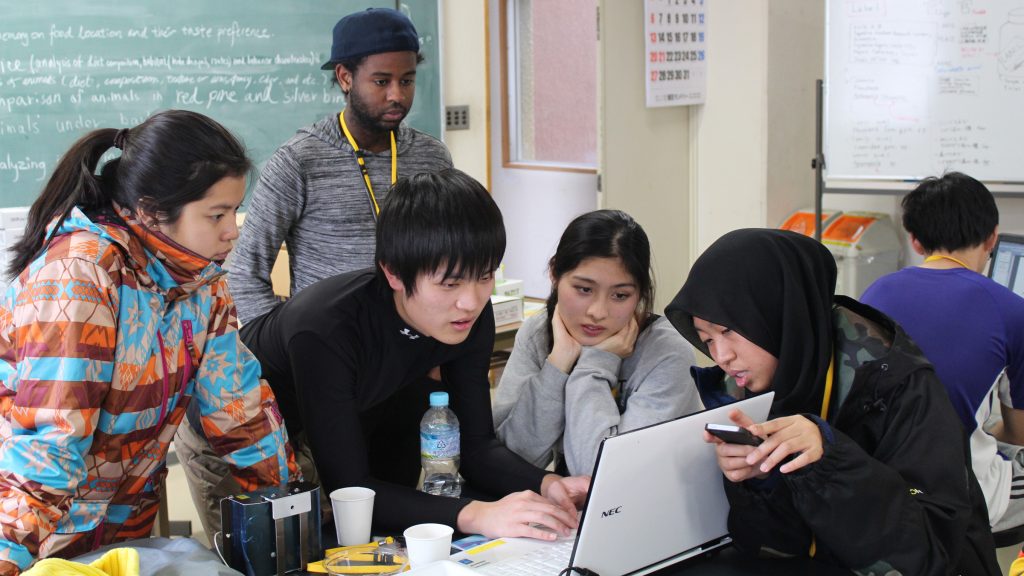
Global Biology in English (E)
Humanity faces environmental and ecological problems which are both broad in scope and great in their scale of impact. As biologists, we are in a unique position to develop potential solutions to these crises. In order to meet these challenges, we need a broad view of science and an international perspective. In this course, we emphasize the development of high-level communication and critical thinking skills, and the nurturing of world-class graduates able to work effectively in a global context. This course will provide a broad English education in biology, along with excellent study abroad opportunities. Students with sufficient language proficiency may also take classes taught in Japanese.
Biodiversity Course (J / E)
After a long evolutionary history, our planet has a rich diversity of living organisms, which influence each other to make up the earth’s nature. In this course, students will learn how these life forms originated, diversify, and keep their lives in relation to the environments, based on their diversity at each level, including molecules, cells, individuals, populations, and ecosystems. Students also learn about the phenomena and laws of nature created by the activities of these organisms and the environment. Through these learnings, students will be expected to think about what life is and refine their view of nature as a global citizen.
Molecular and Cellular Biology Course (J / E)
The structure of the cell, tissue, and body of living organisms is fabulously elaborate. How do the organisms form such sophisticated and functional structures at the molecular, cellular, and organismal levels? This course is intended for students who are interested in understanding the basic principles of molecular and cellular biology. The knowledge gained in this course will also contribute to appreciating applied aspects, such as medical, pharmaceutical, agricultural, and industrial sciences.
Applied Biology Course (J)
Living organisms produce various biofunctional molecules ranging from low- to high-molecular weight compounds. These molecules are used for the regulation of dynamic metabolism, homeostasis, and communications at cellular to ecological levels. In the Applied Biology course, students learn basic knowledge about the structures and functions of biomolecules which are utilized in microorganisms/animals/plants to support their life. The aim of the course is to contribute to the solution of various problems that mankind faces by learning the development and utilization techniques of useful functions of organisms and by applying these techniques.
Computational Biology and Bioinformatics Course (J)
Modern research technologies allow the generation of large-scale datasets related to the diversity and universality of biological structure and function at every level of complexity, from molecules to populations. To make sense of this data, we use computer analysis to extract useful information which can be applied to diverse biological phenomena. In the Computational Biology & Bioinformatics course we explore the interaction between advanced biological research methodologies and high-level computer analysis. Furthermore, we aim to deeply understand the diverse methods of mathematical and information sciences which are fundamental to bioinformatics. Biology specialists with excellent computer skills are in high demand, and graduates of this course have excellent career prospects.
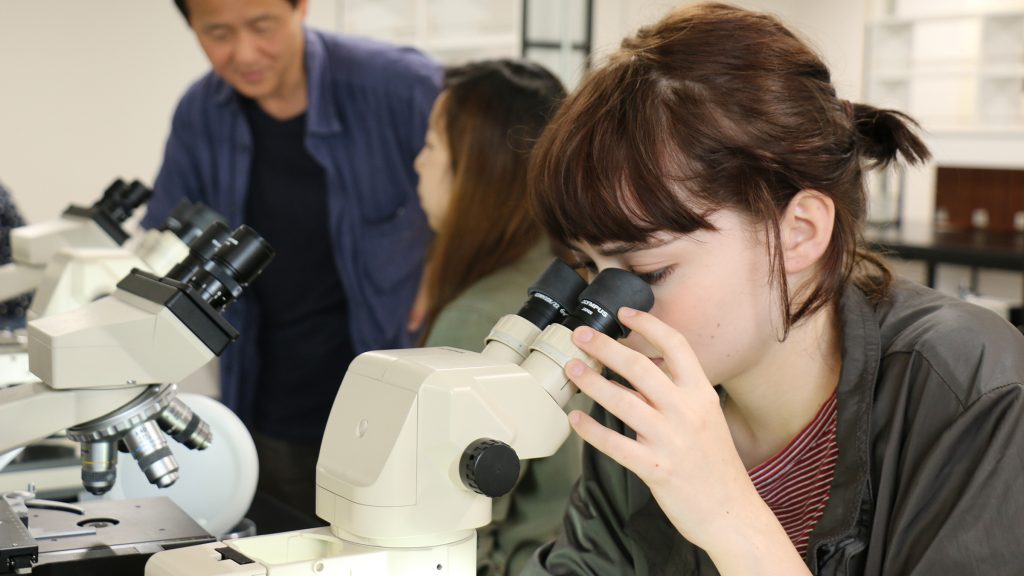
Admissions
The College of Biological Sciences invites applications from well-qualified individuals who have a passion for biology.
Undergraduate applications for the English program are open from mid-October to late November. Screening takes place in two stages; a document screening first, and then an interview by teleconferencing.
The quality of applicants for our program is consistently very high, and admissions to our program are competitive. We expect applicants to have a strong academic record, a demonstrable interest in biological sciences, and sufficient ability to support themselves throughout their studies.
You are required to submit a personal statement (study plan), which clearly outlines your interest in biological sciences. Please outline any experience/internships you may have done, as well as your area of interest (e.g. plants, animals, evolution, genetics, ecology, etc) and future plans after graduation. Although we understand that you may not be completely sure about what you want to do with your life, and that your plans may change over the next four years, we expect applicants to have given some thought to their ultimate goals.
Your financial plan will also form a key component of your application; please take care to follow the guidance carefully. Please be as clear as possible about your sources of support, and your projected expenses. If your parents have agreed to finance your studies, please tell us a little about their ability to support you (e.g. what are their jobs? Are they secure jobs?).
Most applicants who have English as a second language will be required to submit an English proficiency test. If you are unsure whether you require a test, please contact Admissions as soon as possible (contact details available in the application guidelines).
The second stage will comprise of a short interview via videoconferencing (e.g. ZOOM). The interview lasts about 20 minutes, and will discuss your motivations for applying to our College, as well as specific points of your application materials and study plan. At the end of the interview, you’ll be given the opportunity to ask questions to the panel.
Transfer Admissions
Applicants for transfer admissions will submit the necessary forms, including their transcript. There is no first screening for transfer applications, and all transfer applicants will be interviewed. To receive a degree from Tsukuba, you will be required to fulfil our degree requirements. Essentially, credits can be split into four main sections
- Core subjects for major
- Major Subjects
- Elective subjects
- Graduation research credits
Core subjects are basic sciences, such as introductory biology, chemistry and physics courses. These are normally taken in the first semester of college, along with Japanese language requirements, and other core components. Some credits run through your whole degree, such as scientific writing.
Major subjects are in-depth courses relating to biological sciences. These tackle specific areas, such as biochemistry, physiology, genetics, etc.
Elective subjects are taught by other Schools within our university (e.g. Social science, Humanities). The aim of these courses is to broaden your education and perspective on life.
Graduation research is completed in the final year of your program, and comprises of a year-long lab-based research project.
You must complete all these requirements to be able to receive a degree, and depending on your background and the subjects you have completed, we can recommend you for either 2nd year or 3rd year entry.
3rd year entry – in principle you must be able to complete within two years of enrollment. This will require you to have a strong science background, allowing us to transfer a significant number of credits into the “core subjects” and “major subjects” sections, as well as completing “elective subjects” from your transfer credits. The minimum time required for degree completion is 2 years.
2nd year entry – if it is unlikely you could complete within two years, you will be enrolled as a second year student. In this scenario, you must complete a minimum of three years at Tsukuba. If you have a background which lacks significant biology, then it is most likely you would be required to enter as a second year. In some cases, we can provide research opportunities throughout your degree, to help enrich your time at the university.
Program structure
Students are required to complete a minimum of 124 credits to graduate. Credits are split into foundational courses, liberal arts and languages, major subjects, and elective credits. Students are required to complete a minimum number of credits in each section in order to graduate.
Lectures
Lectures form the basis for undergraduate courses. These allow students to develop their knowledge and understanding of the field by taking instruction from leading scientists in their fields. One credit is the equivalent of ten 75-minute lectures, with 2-hours of self-study for every hour of class time. Most lecture courses are 1 or 2 credits.
Assessment is normally by a mix of in-class reports and a final exam. However, in some cases, instructors set an assignment or other work to be completed by students.
Practical Classes
Practical classes (lab and field classes) allow students to develop a hands-on understanding of the subject and practice the skills required to become a functional scientist. Lab courses are nominally rated at ten 3-hour sessions per credit. Field courses at Shimoda Marine Research Center and Sugadaira Montane Research Center are intensive and run during C sessions or holidays.
Generally, students will be evaluated on the basis of a lab or field report completed during the course.
Final Year Project
Students are required to complete a research project under the direction of a faculty member during the final year of their degree. Projects last a full year, and students are expected to work on them full-time. At the end of the project, students present their results to their peers in a departmental seminar. Students have access to well-equipped labs, and are advised by qualified, experienced researchers.
Students are evaluated on the basis of their participation and effort during the research and their final presentation.
Structure and duration
Our degree starts in September, and students are expected to complete approximately 110 credits in six taught semesters, before completing a full-year research project in their fourth year.
Each semester is 15 weeks long, and split into three 5-week sections: A, B, and C. Generally, lectures run in A and B, with intensive practical classes in section C.
Graduation Research
Graduation research is the cumulation of your hard work over four years. You will join a faculty member’s lab, and complete a year long research project.
Some examples can be seen below
| Title | Supervisor |
| Effect of the holoparasite O. minor on clover host growth | Louis Irving |
| Production of chimeric HEV-VLP-M2 protein in tomato fruit and tobacco leaves as edible vaccine against influenza A virus | Michiyuki Ono |
| Localization of encapsulation promoting lectin (EPL) in the hemocytes of Mythimna separata | Seiichi Furukawa |
| Effect of mutiple nutrient pressures on differential root growth of Poa annua | Louis Irving |
| Functional analysis of gnl3 by reverse genetics and overexpression in Dictyostelium discoiduem | Hidekazu Kuwayama |
| The role of CoA-disulphide reductase in Galdieria sulpheraria under metal stress | Ayumi Minoda |
| Mixotrophic cultivation and lipid accumulation of a lichen phycobiont Elliptochloris subsphaerica | Kenichiro Ishida |
| Soil respiration at different stages of ecological succession on Miyakejima | Mitsuru Hirota |
| Effect of amber on pathogen toxicity in C. elegans | Kazuichi Sakamoto |
| Reverse genetic analysis of psnE3 in Dictyostelium discoideum | Hidekazu Kuwayama |
| Starvation-induced maturation in Drosophila melanogaster | Yuko Shimada-Niwa |
| Elucidation of lysosomal glycogenolysis significance in Dictyostelium discoideum | Hidekazu Kuwayama |
| Impairment of mitochondrial homeostasis in PSME4/ECPAS mouse testis | Tomoki Chiba |
| Genotype-specific media optimization for shoot regeneration with Dumaguete Long Purple eggplant (Solanum melongena L.) | Kazuo Watanabe |
| Morphometric analysis of corals collected during the Tara Pacific Expedition | Sylvain Agostini |
| Inflammation and mitochrondiral respiratory dysfunction in an aging mouse model | Kaori Ishikawa |
| Phtheirospermum japonicum derives benefit from host despite not being attached to nutrient-fed roots | Louis Irving |
| The suppression effect of Drino inconspicuoides on a hosts phenoloxidase activity | Seiichi Furukawa |
| Phenotypic observation of DDB_G028809 & DeeJ in Dictyostelium discoideum cells | Hidekazu Kuwayama |
| Exploring new lineages related to a eukaryotes-like planctomycete bacterium Candidatus Uab amorphum | Kenichiro Ishida |
Research Centers
Research is the lifeblood of any academic department. The College of Biology has over 80 research active academic staff, and is supported by three research centers; the Sugadaira Montane Research Center; the Shimoda Marine Research center; and the Gene Research Center.
Sugadaira Research Center
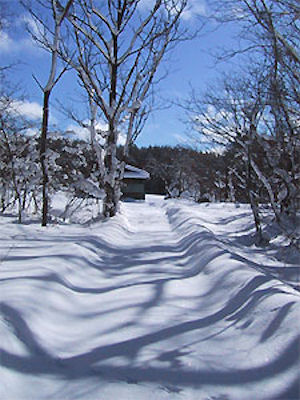
The Sugadaira Research Center is one of the leading highland field study and education centers in Japan. The Sugadaira plateau in Nagano Prefecture is located 1300 meters above sea level. The center has an average annual temperature of 6.6°C, with mid-winter temperatures as low as minus 25°C. There are many rare plant species and a wide variety of animal species found at Sugadaira, many of which are not found elsewhere. The center’s arboretum contains over 200 species of trees.
In winter, the center runs an animal tracking course which is popular with both Japanese and international students. In the summer, the course runs practical classes in plant and animal taxonomy.
The center boasts a range of advanced facilities, such as a weather station, photosynthesis and respiration gas exchange equipment, transmission and scanning electron microscopes and DNA sequencing equipment.
The facility is also shared for Agro-biological and Geoscience training courses, and is used by more than a dozen research students, but also more generally it is an education center with many schools visiting the center.
Shimoda Marine Research Center
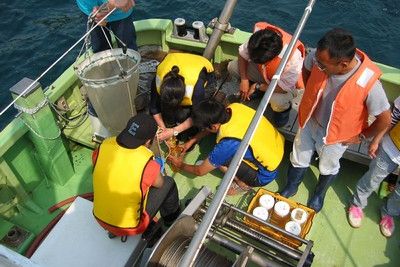
Shimoda Marine Research Center is located at the southeast tip of the Izu peninsula and faces Oura bay, a fork of Shimoda bay. Facing the Pacific Ocean, the center is located in a picturesque environment. Just outside the center is a sandy beach, while rocky and boulder shore areas are also close, providing a wide range of environments. The rock reef provides a suitable habitat for a wide variety of marine organisms.
Various research fields are being pursued at Shimoda, including; Invertebrate taxonomy, Developmental Biology of ascidians, Phycology and Marine Animal Ecology. Over 6000 people visit the Shimoda Center annually, and this facility includes research buildings, an aquarium, laboratories, and dormitories. Additionally, the center has two research vessels (18t and 0.5t), as well as facilities for DNA sequencing, electrophoresis, and electron and light microscopy.
Shimoda Center is the best equipped and most advanced such facility in Japan. Five faculty members, along with graduate researchers and students stay at this facility on a permanent basis, providing practical training in marine biology.
Gene Research Center
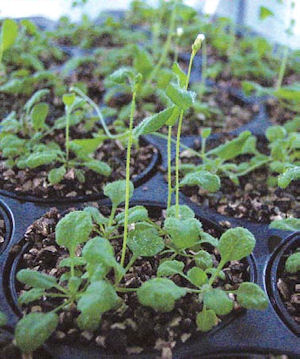
Genetic Research Center and analysis are absolutely imperative to a great deal of research in biology nowadays. Gene research requires various advanced equipment and facilities for recombinant DNA experiments. The Gene Research Center is one of Japan’s leading institutes, equipped with advanced facilities and specialized for DNA research, including state-of-the-art automated DNA base sequencing equipment, a mass spectrometer, and laser confocal microscopes.
Students will not use this facility until their third year for specialized experiments, but this facility is important in supporting undergraduate teaching, even at lower levels. The Gene Research Center holds training courses for overseas researchers and domestic science teachers.
Sugadaira Field Trip Report
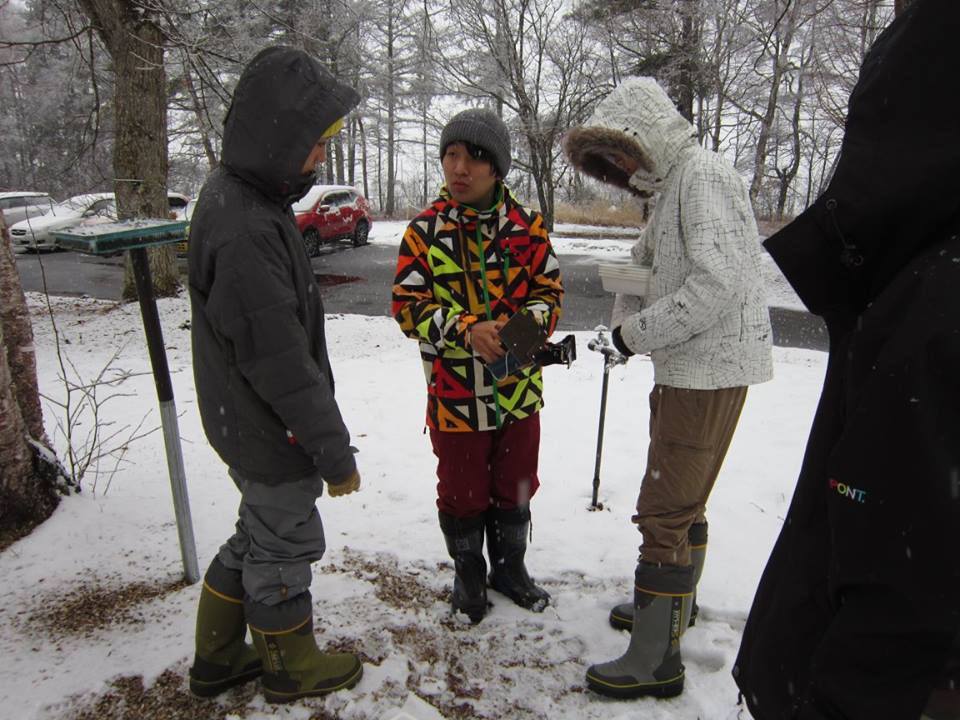
We went on a field study trip to the Sugadaira Montane Research Center, a research center of University of Tsukuba in Ueda, Nagano for five days during Spring break from March 7 until March 11, 2016. This course aims to provide a genuine experience of the qualities of nature and wild animals in snowy mountainous areas through animal tracking, bird watching, and collecting insects. To get to the Ueda Station, we could take either shinkansen (bullet train; around 2 hours) or express bus (4 and a half hours). We preferred to take an express bus from Tokyo to Nagano Station, and continued by train from Nagano to Ueda Station. From there, we took a local bus to Sugadaira-Kogen, where the research center is located.
All students were expected to arrive at the research center before 15:00 in time for the opening orientation. After the orientation to which the dormitory rooms we were assigned, and the rules for using the research center and dormitory were introduced, and we received a lecture from Professor Ryuichiro Machida titled “Field Guide to Snow Land Animals in Winter,” covering an introduction to the course, such as the physical characteristics of winter birds, and animal tracking through footprints and scat. We were divided into groups of five to carry out our own research which we would present on the last night of the field study.
Course Catalogue
Our degree offers a broad education in fundamental and applied aspects of the biological sciences. On this page, you can find a list of courses available in English.
Finance
Planning your finances for university studies can be difficult. Your main expenses will be tuition, accommodation rent, food and living expenses, travel, and personal expenses. This page will provide information regarding financial information for students entering the English program in Biological Sciences.
Tuition fees
Partial and full tuition waivers are available for high performing students with financial difficulties.
Scholarships
The University’s Tsukuba Scholarship is open to all students, and provides 60,000 yen per month living allowance. For first grade students, the scholarship period is September to March. Thereafter, the scholarship period would be from April to March.
There are a variety of other scholarships available to international students, and the university can help students apply. Please note that many scholarships require students to hold a student visa, so students who have a Japanese passport may not be eligible for some scholarships.
A list of scholarships can be found on the university’s main webpage.
Admissions Center
For details of admission, please visit the following web page of University of Tsukuba.
